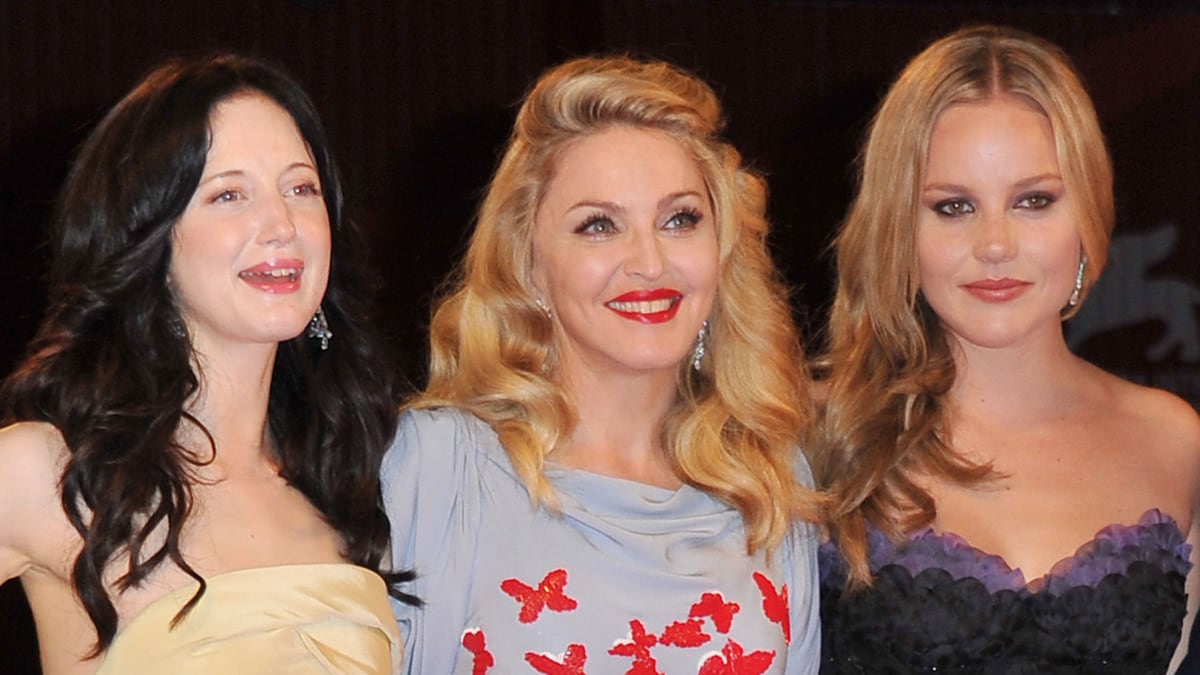The last 48 hours in Venice have been dominated by talk of Madonna’s film W.E., the tale of American socialite Wallis Simpson, the Duchess of Windsor, and her third husband, the Duke of Windsor, who became Britain’s King Edward VIII, surreally spliced with a love story set in 1998 Manhattan—or "a beautifully crafted, passionate tale about the search for true love in the modern world, viewed through the prism of one of history’s most fabled romances" according to the official synopsis.
W.E. was always going to be the sitting duck of The 68th Venice Film Festival, and on first encounter it certainly has all the hallmarks of another Madonna film just waiting to be torn apart by the critics: Wally Winthrop (Abbie Cornish) is stuck in an abusive marriage, becomes fixated with the upcoming auction of the estate of the Duke and Duchess of Windsor, and then finds salvation when she falls in love with the Russian security guard she sees every day while fondling objects from the estate at Sotheby’s. The security guard turns out to be a piano-playing intellectual. (“I love Russians … they’re usually unfairly portrayed in films as either gangsters or hedonistic billionaires,” Madonna said Friday. “But all the Russians I know are intellectuals or musicians.”) All this is intertwined with the parallel story of Edward VIII’s abdication, so we flick between times and between Wally and Wallis, occasionally seeing them in the same scene consoling one another or having a brief exchange.

The film’s main problem is that Andrea Riseborough (best known in the U.K. for her BAFTA-nominated performance as Margaret Thatcher for BBC) is simply too good. Her beautifully poised, mesmerizing performance, capturing what Riseborough describes as an “unmoving, intense androgyny, with [nevertheless] this beautiful aesthetic,” leaves you wanting to fast forward through all of the scenes set in 1998 (which are almost unwatchable in comparison, teetering between implausible and hackneyed) and step back into the altogether more authentic and fascinating world of the duchess. Madonna has made it clear that she didn’t want to create a biopic, that she created Wally because she felt the movie “needed a point of view,” and she “wanted to use the auction as a device to go back and forth” and therefore “[needed] to create a modern day character that was at that auction.” She clearly believed this device would make the story more accessible and relevant. If only she’d had the courage or experience to trust that Riseborough’s performance, combined with Arianne Philips’s beautifully detailed costumes and Hagen Bogdanski’s (The Lives of Others) striking cinematography, would be more than enough.

Yes, she over-egged the pudding, but W.E. is a drastic improvement on her previous film, Filth and Wisdom, and provokes an important discussion on what Madonna described Friday as “a pattern we have in society, when women have some kind of power and we don’t understand them … we have to diminish them by turning them into heretics and burning them at the stake … we can’t come to terms with a powerful, childless woman.” There is no doubt that Wallis bore the brunt of the blame for Britain losing its rock-star king, viewed at best as the brazen, married American who came in and stole Edward away from the country, and at worst labeled a Nazi, a man, or a whore—or all three. Madonna certainly succeeds in creating the “more well-rounded portrayal of Wallis” she hoped to, and in attempting to shed light on how difficult it must have been for the demonized Simpson—a view echoed by Riseborough when I ask her whether she feels Wallis was a scapegoat. “Of course,” she said.
In researching and making the film, Madonna seems to have laid to rest some of her own demons, having not only been an outsider but also often reduced to a sound-bite herself. She’s also tussled with issues of female identity. When asked what advice she’d give to young women, she simply replied: “Get a life,” the words of the duchess when she stumbles across a downtrodden, broken-looking Wally standing and staring at her as she struts past. It is these three words that encapsulate the film’s greatest achievement. By creating a somewhat incomprehensible, unsympathetic character in the form of pathetic, delusional Wally and a strong, witty, fearless Wallis, Madonna is able to send out a message loud and clear to young women: stop feeling sorry for yourselves and get a life—good advice from one of the world’s most famous and successful women, who described herself during our discussion of the film as “not a feminist” but rather “a humanist.” Amid the endless whingeing and empty rhetoric of the “feminazis” that seem to dominate all debate on women’s issues, this is certainly a welcome point of view.





